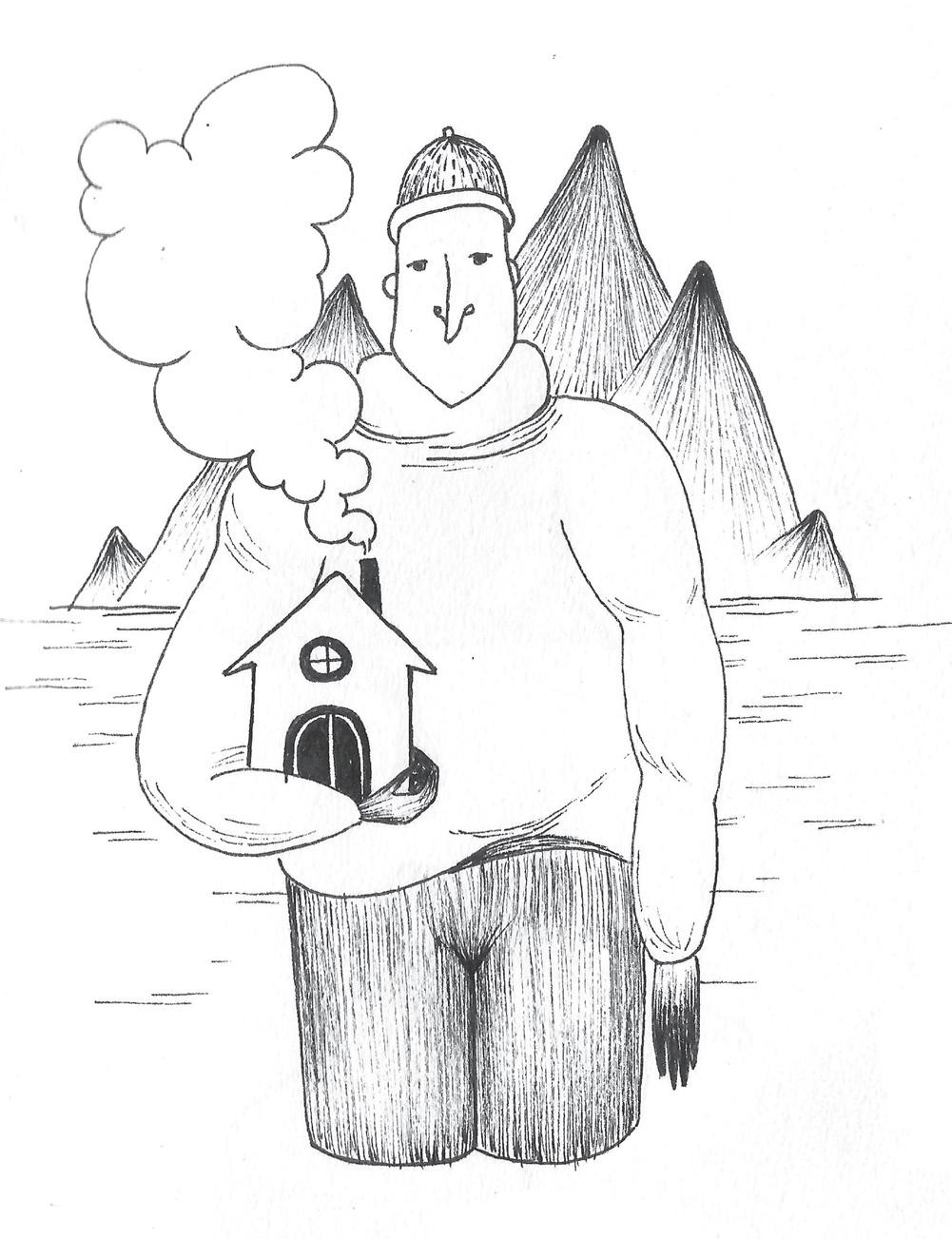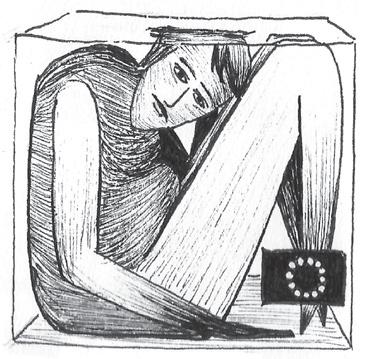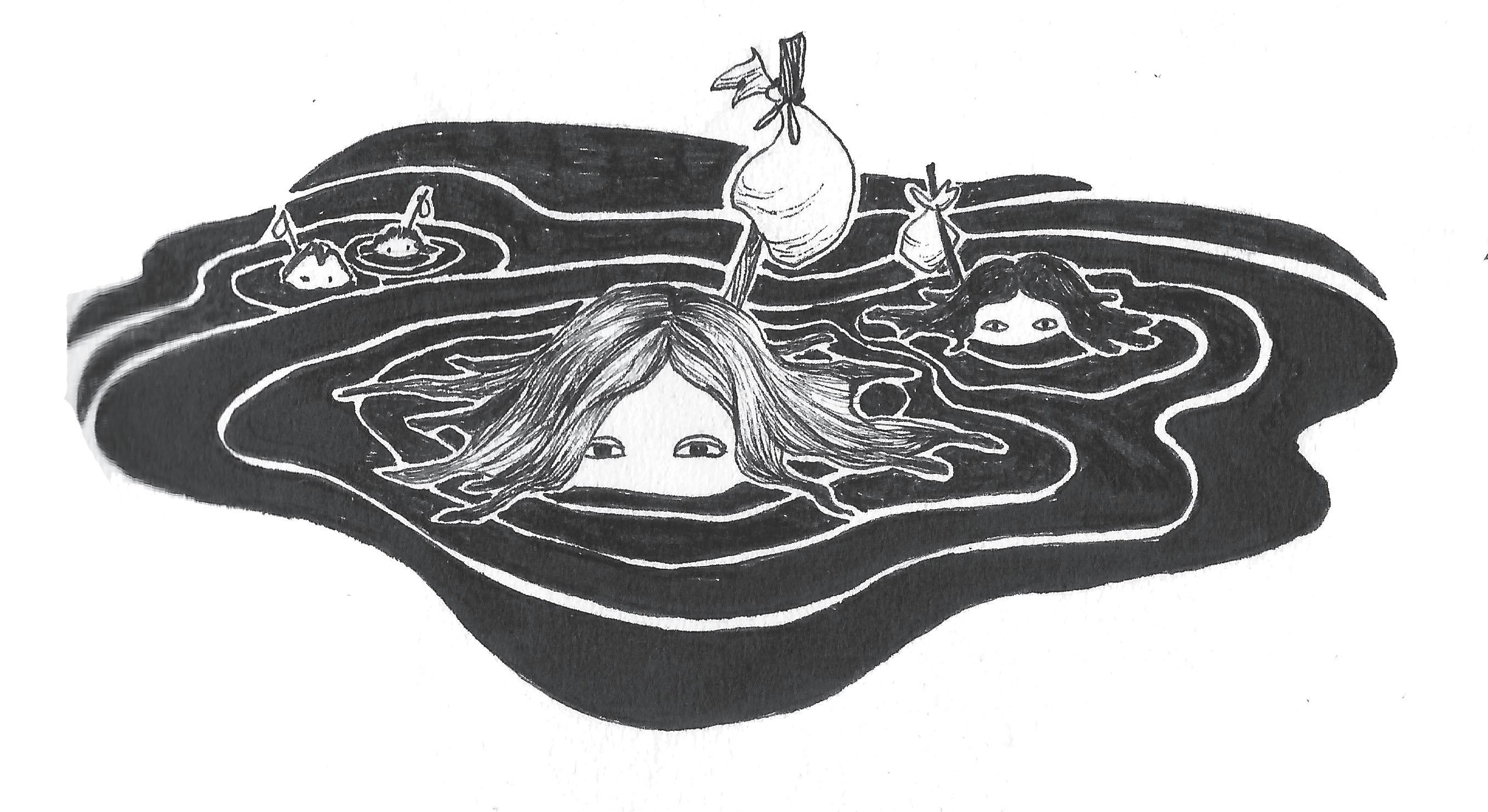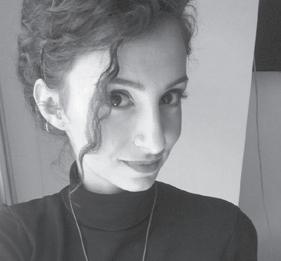
8 minute read
Greek Hospitality: An Ancient History
— angelikí maría mitsaki

Advertisement
The “refugee crisis” is not a new phenomenon in Greek society. Geographically, it constitutes the crossroad of three continents, which has always made Greece a multicultural place. The refugees and the exiles in ancient Greece were protected from most of the laws in different polis-states and they had the right to ask for aid and help.1
In the ancient Greek pantheon Zeus was, among other things, the protector of the strangers. Zeus Xenios, Philoxenon, or Hospites, was the patron of ξενία, which could be translated as “hospitality” or “guest-friendship” and it has one very basic rule: The respect from host to guest and guest to host in reverse. In those times it was believed –in a religious way– that every stranger who was asking for hospitality could potentially be Zeus disguised. For this reason,
1 https://www.rsc.ox.ac.uk/events/exile-refuge-and-the-greek-polis-betweenjustice-and-humanity / https://www.rsc.ox.ac.uk/news/the-history-of-refuge-public-seminar-series-hilary-term-2015 the host was obliged to house the stranger and offer him or her the best food, drink, bath and any other kind of comfort for as long as he or she wanted to stay, without making questions like where are you from or how long are you planning to stay. The guest in its turn had to be courteous to the host and not be a burden. In the end of the hosting period the host must give a present to the guest and the guest had to do the same –if he/she had one–.2 When Christianity became the prevailing religion of the Roman Empire, a lot of things changed but a lot survived, not as religious signs or behaviors, but as collective traditions. This is the origin of the strong tradition of hospitality in Greece.
During medieval times, Greece was part of the Byzantine and later Ottoman Empire, which were also multinational and multireligious. The reality was different according to the social class and the religion, but generally, people used to live harmoniously all together for more than half a millennium. Nikiforos Choumnos, an important sapient, humanist and senior state officer of 14th century said: “No man will be left homeless, as long as Thessaloniki exists”3, a crucial phrase which until now reflects the overall hospitality of the Thessalonians and broader the rest of the Greeks.
The Revolutions of 1848 that caused the transition of the old empires into modern nation-states led to the rebirth of the Greek State. The main substances for its creation were language and religion. As the Ottoman Empire was getting weaker, different ethnic groups started to rebel and to demand their independence. A lot of battles took place, creating thousands of refugees.
In the end of the Greco-Turkish war (1919-1922), the Greeks of Eastern Romelia, Pontus, Asia Minor and Anatolia were
2 The Odyssey: Be our guest with Xenia - Classical Wisdom Weekly”. Classical Wisdom Weekly. Retrieved 2016-04-26. / http://classicalwisdom.com/the-odyssey-be-our-guest-with-xenia/
3 https://www.peebe.gr/istoria/o-nikiforos-choumnos-ki-emis/ forced to abandon their homes and become refugees. About 1.500.0004 people arrived as refugees to Greece. Another 50.000 Greeks from Pontus escaped to Soviet Union and 17,000 from Pontus, Asia Minor, Aegean Islands and Anatolia walked to Aleppo (Syria). Half of the people who started the route to Aleppo died of hardship or disease. When they finally arrived in Aleppo, they faced poverty.5Syria and Lebanon accepted refugees from Crete; more than
4 http://ebooks.edu.gr/modules/ebook/show.php/dsgl-C102/79/647,2410/
5 http://www.kathimerini.gr/856163/article/epikairothta/ellada/mikrasiates-prosfyges--toy-1922--sth-syria and https://damomac.wordpress.com/2014/11/25/ remembering-the-greek-refugees-in-aleppo-by-helping-the-syrian-refugees-in-athens/and http://fractalart.gr/ellines-prosfiges-syria/
40.000 Muslim Cretans moved to Syria and 7.000 to Tripoli between 1897 and 1922.6 There are still Greek-speaking villages in Syria today.7
Greece was also involved in two Balkan wars (12th of October 1912 – 30th of May 1913 and 16th of June 1913 – 18th of July 1913), in wwi (1914-1918), in the Corfu incident (1923), in the Incident at Petrich (1925), and a national conflict that almost led to a civil war between the King and the Prime Minister ( 1914-1917). This left the country in a terrible financial condition, which made the reinstatement of all these thousands of refugees very difficult. The Greek State in the beginning organized refugee camps. Afterwards, it gave them empty houses the Turks had left behind when they moved to Turkey, and fields and subsidies. The refugees were moving all around the country, trying to find a place to relocate.8
Unfortunately, a large percentage of the local population did not look kindly on the refugee wave. Discrimination was always an issue. A lot of the locals saw the refugees as another “problem” added to the ones they already had. The poor Greek lower class Greece saw its wages getting lower or lost their jobs because of the refugees’ cheaper working hands. They felt that the refugees were put in privileged positions.9
The Orthodox Church of Greece immediately started to offer food and accommodation. Shortly, it granted buildings, houses and fields to the State from its private wealth to cover the needs of the refugees and to create new minis-
6 http://apopsilive.gr/kriti/xamintie-chorio-ton-8-000-kritikon-stin-suria-kaiepistrofi-stis-rizes also the documentary of D. Manolesakis https://www.youtube. com/watch?v=Gp0aK4axxky
7 http://www.kathimerini.gr/321721/article/epikairothta/ellada/ellhnikes-dialektoi-an8ektikes-sto-xrono
8 https://kars1918.wordpress.com/2010/03/09/refugees-1922/ and http://asiaminor.ehw.gr/forms/fLemmaBodyExtended.aspx?lemmaid=3665
9 http://www.efsyn.gr/arthro/apo-tis-paragkes-sta-prosfygika and http://www. efsyn.gr/arthro/irthan-oi-prosfygges-na-paroyn-psomi-mas tries, new public hospitals, new schools and other kind of public services. The Church also offered money to the totally empty State coffers. As time passed and refugees started to normalize, new populations were created and alongside them New Holy Metropolises (local administrative divisions of the Autocephalous Orthodox Church of Greece) were born. The Orthodox Church of Greece got bigger, its administration system was enlarged and its pastoral and spiritual work increased and got more intense and methodical.10
At this period the first dictatorships in Greece started (19221924, 1925-1926, 1927). By the end of this decade, when the political scene got more stable, Greece entered a turbulent period: its hardest dictatorship until that time (1936-1941), wwii (1941-1945), our civil war (1945-1949), and another dictatorship (1967-1974) and about fifteen years of political changeover followed, becoming member of European Union in 1981. The political scene was radically changing all over the world. During the decade of ‘90s the regime of Enver Hoxha fell and about one million Albanian migrants entered Greece. In addition, great numbers of Ex-Soviet Union citizens came seeking better life conditions. Furthermore, between 1970 and 2000, 480.000 repatriated Greeks, who had escaped to the Soviet Union mainly during the Greco-Turkish war, returned to Greece in search of a better life conditions.11 Most of these people couldn’t speak Greek or they weren’t Orthodox Christians (the majority of the Albanians for example were Muslims).12 The Greek society proved its tolerance and flexibility by accepting and integrating all these numbers of refugees and migrants among a local population that did not exceed ten million.
10 The data and the information about the contribution of the Orthodox Church of Greece are based on e-mail that most of the Metropolis have sent me from their historical archive after a personal contact I had with them.
11 http://www.mighealth.net/el/index.php/%ce%A0%ce%B1%ce%bb%ce%bb%ce%B9%ce%bd%ce%bf%cf%83%cf%84%ce%bf%cf%8D%ce%bd%cf%84%ce%B5%cf%82
12 For more detailed information see also the final report of a study conducted for ιμεπο [Migration Policy Institute], Greece by Mediterranean Migration Observatory uehr, Panteion University at 15th of November 2004
Since 2008, when the global financial crisis started, many things have changed in Greece. Unemployment rates today reach 21.2% of the total population and 43.3% among the young persons (the highest rates in Europe),13 a lot of them lost their houses. The average number of suicides in Greece has more than doubled since the beginning of the crisis14. Meanwhile, the prevalence of mental illness has increased greatly.15 16
Refugees from Syria have been trying to cross the sea between Greece and Turkey almost since 2012, but in 2014 their numbers increased rapidly and about 216.000 people crossed the Aegean Sea with 3.500 of them dying or missing. In 2015 there was the highest number of people crossing the borders Greece: about 1.015.000 people entered Greece with almost 4.000 dead or missing. At that time most of these people were still more or less free to spread into eu17. In 2016, 363.000 people crossed the sea boarders with 5.000 of them missing or dying during the attempt. The agreement
13 http://www.iefimerida.gr/news/366510/sto-212-i-anergia-stin-ellada-ton-ioynio-megalytero-pososto-stin-ee
14 http://ellinikahoaxes.gr/2017/05/26/suicide-rates-in-greece/

15 http://repository.library.teimes.gr/xmlui/handle/123456789/4140
16 http://www.enet.gr/?i=news.el.article&id=391423
17 https://www.theguardian.com/world/2016/mar/08/eu-turkey-refugee-dealqa and Turkey halted the high numbers of the human influx and until the end of August of 2017 only 20.000 people crossed the boarders.18 Most of the refugees are men and children under the age of sixteen. Their nationalities vary.
Most of these people do not want to stay in Greece. Greece cannot handle this immense amount of people financially, and their integration seems to be quite difficult in the middle of the crisis. Also, when the refugee and migrant influx started in 2014 the Greek islands were not prepared. During all the seasons of the year, thousands of people were arriving to the coasts, almost dead, frozen from the hours or days they spent in the water, exhausted from hunger, thirst and sleep deprivation, some of them suffering from chronic diseases and others sick because of the route they followed and the hardships they faced. Pregnant women, mothers with infants, elderly, people with disabilities, and unaccompanied kids were arriving by the thousands every day in a place that they could hardly communicate with the locals because of the language and cultural distance. In front of this situation, ngos, locals, political groups and parties, schools and universities, any kind of organization with
18 https://data2.unhcr.org/en/situations/mediterranean social and humanitarian characteristics and of course the Greek Orthodox Church rushed to offer medical care, clothing, food and accommodation.19
When the borders closed and a lot of these people got trapped inside Greece, the already hard situation became worse. The Greek State cooperated with public universities, the Red Cross, the Orthodox Church and other kind of formal organizations basically based on volunteers20 –also a lot of strange foreign organizations appeared among this mess and suddenly problems of trafficking mafias, drug and/or organs trade and jihadism appeared – and with the financial support of eu, very soon these people started to find a place to stay, a place to take a shower and to pray and monetary support for their daily needs. Priority is given to single mothers, pregnant women, families, unaccompanied kids, the elderly and disabled persons or families which include disabled persons.21
The current number of these refugees and migrants still living inside the Greek territory is about 62.000.22 Unfortunately, there are also many who are not declared. Some low rent neighborhoods have been turned into unofficial ghettos.23 The incretion of criminality and the degradation
19 http://news247.gr/eidiseis/koinonia/mia-fwtografia-ekatommuria-lekseis-anthrwpias-h-istoria-pisw-apo-to-kare-me-tis-giagiades-kai-to-prosfygopoylo.3727854.htmland https://www.youtube.com/watch?v=Hb_Hdjy4cvw or https://www.youtube.com/watch?v=szkrehVcbAs and https://www.youtube.com/ watch?v=71kl_3cpx6Q
20 http://www.huffingtonpost.com/entry/volunteers-with-greek-refugees_ us_574f54b3e4b0eb20fa0cb52c
21 http://www.cnn.gr/news/ellada/story/90866/stylianidis-avramopoylos-30000-prosfyges-se-spitia-mexri-to-telos-toy-2017
22 http://www.ekathimerini.com/220397/article/ekathimerini/news/official-data-show-refugees-migrants-in-greece-at-62407
23 http://www.newsbeast.gr/society/arthro/306920/ena-suglonistiko-odoiporiko-sta-geto-tis-proteuousas of human life, along with the financial crisis and the endless corruption of the Greek politicians, led to the rising of the Golden Dawn, a neo-Nazi political party that entered the Greek Parliament in 2012. There are a lot of cases that Golden Dawn members attacked and killed migrants and refugees. They also have physically attacked public workers and local politicians.
Unfortunately, there is a part of Greek society, which in one way or another supports the tactics and the crimes of Golden Dawn. It is an expectable reaction considering how easy it seems for the people to oppress someone weaker than them instead of the one who directly oppresses them. It is social cannibalism.
The Bible says “For I was hungry, and you gave Me something to eat; I was thirsty, and you gave Me something to drink; I was a stranger, and you invited Me in” (Matthew 25:35). The Orthodox Church always used to march among the centuries with this concept, helping all the people who live inside the Greek territory who asked for it. It does not divide society between orthodox and not orthodox, locals or foreigners, Greeks or refugees. For the Orthodox Church it is clear in action that every person in need represents the person of Jesus Christ.
Greece is a country that faces a lot of difficulties, and has its contradictions, just like any other country in the world, but until now it hasn’t lost its human reflection. Even if there are negative or closed-minded people, the general feeling is the ancestral xenia characterized by respect and freedom.
— angelikí maría mitsaki
Angelikí María Mitsaki is an orthodox theologian, who works at Muhyiddin ibn Arabi Society – Latina in Spain. Her interests are oriented towards Islamic mystical theology and religious freedom.







